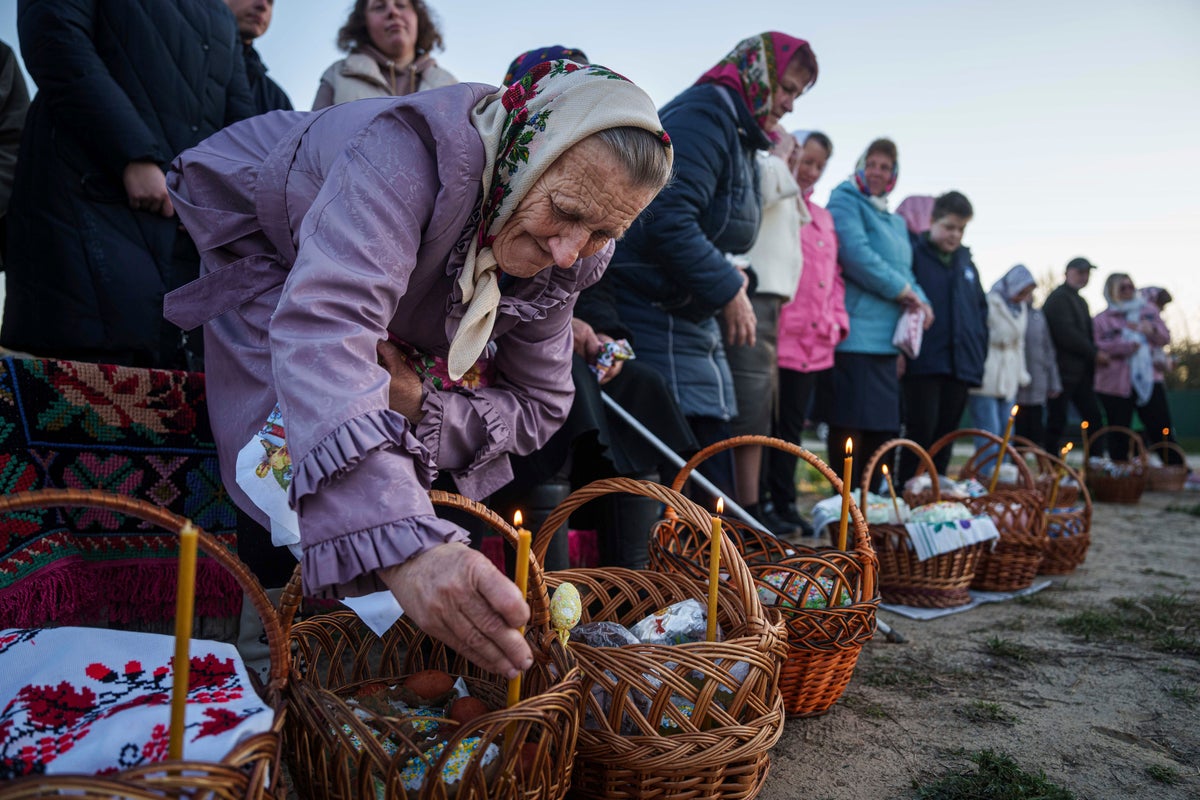
Ukrainians gathered together to mark Easter, with little faith in the possibility of a ceasefire with Russia as both sides accused the other of breaking a temporary truce.
Russian president Vladimir Putin announced a unilateral 30-hour ceasefire from Saturday evening to midnight on Easter Sunday, citing humanitarian reasons.
But Ukrainian president Volodymyr Zelensky accused Mr Putin of pretending to observe the truce while carrying out hundreds of artillery attacks on Saturday night, followed by more on Sunday.
Late on Sunday, Mr Zelensky said there had been 1,882 cases of Russian shelling, 812 of which involved heavy weaponry, according to his Commander-in-Chief of the Armed Forces of Ukraine Oleksandr Syrskyi.
“Either Putin does not have full control over his army, or the situation proves that in Russia, they have no intention of making a genuine move toward ending the war, and are only interested in favourable PR coverage,” Mr Zelensky posted on social media.
“However, there were no air raid alerts today. Hence, this is a format of ceasefire that has been achieved and that is the easiest to extend,” he said, proposing that Russia abandon drone and missile strikes on civilian targets for at least 30 days.
Kremlin spokesman Dmitry Peskov, however, said there was no order from Putin to extend the ceasefire.
Also on Sunday, Russia’s defence ministry claimed Ukraine had broken the Easter ceasefire more than a thousand times, inflicting damages to infrastructure and causing civilian deaths.
The ministry said Ukrainian forces had shot at Russian positions 444 times while it had counted more than 900 Ukrainian drone attacks, including on Crimea and the Russian border areas of the Bryansk, Kursk and Belgorod regions.
Meanwhile, Mr Trump, posting on social media just before the truce ended, said “hopefully Russia and Ukraine will make a deal this week”. The US president has been pushing for a deal for several weeks and on Friday threatened to walk away due to a lack of progress.
In northern Ukraine on Sunday, dozens of Ukrainian civilians gathered outside the ruins of a damaged church to mark Easter, casting doubt on a stop to the fighting with Russia.
In the village of Lukashivka in the Chernihiv region, briefly occupied by Russian forces in 2022, parishioners of the damaged Ascension Church arrived early at a small makeshift wooden church built last year to cater to the needs of the faithful, holding traditional Easter baskets and cakes to have them blessed.
As the sun rose, they stood quietly in the spring chill, the roofless silhouette of the wrecked church behind them, its pale walls scarred by shell fragments. The church’s priest Serhii Zezul walked among them, shouting “Christ is risen!” as he sprinkled holy water over the baskets – his voice nearly drowned out by the hum of a nearby generator.
More people than usual gathered in the damaged church’s courtyard on Sunday. Some said they drove from cities to Lukashivka to mark Easter, fearing Russian forces might target large gatherings, especially after a recent string of missile strikes killed dozens of civilians.
For 26 years, 44-year-old Olha Rudeno attended church in the nearby city of Chernihiv, where she got married. “But given the war, it’s psychologically difficult for me to go where there are large gatherings in cities,” she said.
Mr Rudeno does not think a ceasefire with Russia will happen. “Believing in a ceasefire is deceiving yourself. I don’t know how much time has to pass for me to truly believe one is possible,” she said.
Elsewhere in Ukraine, believers attended a ceremony of blessing Easter cakes and traditional food baskets in the town of Bucha in the Kyiv region on Sunday. It followed an Easter service at the St Andrew’s Church.
Ukrainians also prepared Easter baskets to be blessed during celebrations of the Orthodox Easter in Krasne village.
Others were seen being sprayed with holy water by an Orthodox priest during an Easter service in Chernihiv early in the morning.
On Saturday evening, priests were blessing Easter baskets and reading prayers during a celebration of the Orthodox Easter in Lviv, Ukraine.
Doubt of a truce between Russia and Ukraine has deepened as US-led efforts have so far yielded no breakthrough. Moscow has effectively rejected a separate, comprehensive ceasefire proposal, backed by Mr Trump and endorsed by Ukraine, tying any agreement to a halt in Kyiv’s troop mobilisation and Western arms supplies – conditions Ukraine has refused, fearing they would allow Russia to regroup and escalate.
“My personal opinion is that there will be no ceasefire,” said Mr Zezul. “And even if there is one, there are no details on where it would apply. On the frontline, our soldiers are still fighting.”
Still, Mr Zezul said that celebrating Easter among ruins reflects the resilience of faith during war. “Despite everything, people still gather. They believe in something better. We are being reborn, we are standing back up. Truth always triumphs over evil. People believe that, they hope for that.”
The restoration of the original Ascension Church in Lukashivka, a 20th-century architectural landmark, would require at least hundreds of thousands of dollars, money the community does not have as the war rages on.
Since the start of Russia’s full-scale invasion in February 2022, about 530 churches across Ukraine have been damaged or destroyed, and at least 25 clergy members have been killed, according to Ruslan Khalikov, head of the “Religion on Fire” project, which monitors Russian war crimes against religious communities.
“A destroyed church is a shattered soul of the community,” Mr Zezul said. “When churches fall, the heart and core that unite people begin to collapse.”
In his Easter message, Mr Zelensky reflected on suffering and the struggle to hold on to faith. “Each of us has lived through such moments … and you ask: ‘God, why is this happening to us?’”
He also mentioned the deadly missile strike on Sumy during Palm Sunday, and the bombardments of Kryvyi Rih, Kharkiv, Dnipro, Odesa, and other cities, saying people tend to turn inward when they cannot make sense of things.
“Something invisible yet powerful within us doesn’t let us give up. It shows us where to find the light, so we don’t lose our way.”
Source: independent.co.uk


